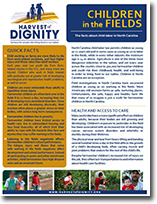Faces in the Fields
 Thursday, June 30, 2011 at 4:19PM by
Thursday, June 30, 2011 at 4:19PM by  Chris Liu-Beers
Chris Liu-Beers  Workers harvesting sweet potato in 2009. Photo by Peter Eversoll.By Zachary Kohn
Workers harvesting sweet potato in 2009. Photo by Peter Eversoll.By Zachary Kohn
Law Intern, NCJC
J.D. Candidate 2013
UNC School of Law
This summer on outreach, I had the privilege to talk to farmworkers about everything from La Copa de Oro to minimum wage laws, and witnessed everything from scrimmage soccer matches, to workers trotting home under a majestic sunset with dozens of buckets strapped to their limbs, to tractors spraying pesticides in fields right next to farmworker housing. I enjoyed the aroma of delicious traditional meals being prepared at the end of the day, shared tortillas off of a truck with famished workers and even filed a few complaints with the NCDOL on behalf of farmworkers.
Among the most memorable experiences so far was at a migrant labor camp where workers are suffering from bed bugs, snake bites, inadequate bathroom and water breaks, and housing with malfunctioning toilets, refrigerators, and stoves. The farmworkers at this camp, a talkative and friendly bunch, did not bring up any of these issues until we had been talking for hours. Even when the problems came to light, almost no worker wanted to file the complaint, even anonymously, out of fear that their employer might retaliate. Fortunately one worker had the desire for change. He told us that he would make the complaint not for himself, but for his fellow workers and future workers living at that camp. I cannot imagine a better client or a more righteous act.
Migrant farmworkers, just like anybody else, need to be able to prepare and store food free from insect infestation, earn livable wages, receive proper medical care, have access to water and bathrooms at the workplace, work in a location free from exposure to pesticides, have privacy in their homes and sleep on actual beds with mattresses. And no one should have to work for an employer who takes advantage of him or her. Unfortunately, most of what we would consider basic requirements for human beings appears to be frequently denied to these incredibly hardworking, optimistic people.
Nonetheless, we can apply the same optimism and dedication the farmworkers have when they travel thousands of miles from home to do back-breaking work, by refusing to let others treat these workers as a distant abstraction. We must do everything in our capacity to demonstrate our belief that these honest people deserve an opportunity for a better future instead of being cheated, abused and lied to. We can witness, speak to farm workers, share our knowledge with others, make documentaries, pressure the legislature to pass bills in favor of humane treatment of farm workers, write about our experiences with workers, file complaints on their behalf, and even file lawsuits. What we cannot do is be complacent and accept their mistreatment. We must act.
The outreach trips have been one of the most rewarding aspects of my legal internship at the Justice Center. Aside from interacting with clients and brushing up on my Spanish, I witnessed the hidden realities of our agricultural system, awakened to the plight of the truly impoverished, reignited my desire to study law and learned firsthand that even in the most truly difficult situations people can find happiness and hope. While it's frustrating at times to see progress in farmworker's lives develop so slowly, I can only hope that they have received at least a fraction of the benefit I gained from participating in this incredible experience.
 housing,
housing,  labor conditions,
labor conditions,  outreach in
outreach in  Guest Post
Guest Post 










